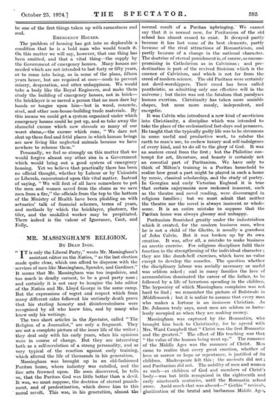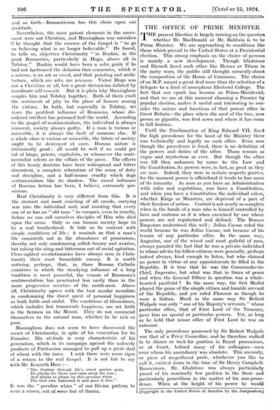MIL MASSINGHAM'S RELIGION.
BY DEAN INGE.
"TT is only the Liberal Party," wrote Mr. Massingham's assistant editor on the Nation," as the last election made quite clear, which can afford to dispense with the services of men like Massingham, Spender, and Gardiner." It seems that Mr. Massingham was too impulsive, and • too much in deadly earnest, to be a good party man ; and certainly it is not easy to imagine the late editor of the Nation and Mr. Lloyd George in the same camp. tut the expressions of regret and respect which from many different sides followed his untimely death prove that his sterling honesty and disinterestedness were recognized by all who knew him, and by many who • knew only his writings.
The two short articles in the Spectator, called "The Religion of a Journalist," are only a fragment. They -are not a complete picture of the inner life of the writer ; they deal only with his early years, when his opinions were in course of change. But they are interesting both as a self-revelation of a strong personality, and as very typical of the reaction against early training, which altered the life of thousands in his generation. Massingham was brought up in an old-fashioned Puritan home, where industry was extolled, and the fine arts frowned upon. He soon discovered, he tells • us, that the Puritan God was little better than a devil. It was, we must suppose, the doctrine of eternal punish- ment, and of predestination, which drove him to this - moral revolt. This was, in his generation, almost the normal result of a Puritan t pbringing„— We cannot say that it is normal now, for Puritanism of the old school has almost ceased to exist. It decayed partly because it has lost some of its best elements, partly because of the rival attractions of Romanticism, and partly because of a change in the national character. The doctrine of eternal punishment is, of course, as uncom- promising in Catholicism as in Calvinism ; and pre- destination is part of the revived Stoicism which is the essence of Calvinism, and which. is not far from the creed of modern science. The old Puritans were certainly not devil-worshippers. Their creed has been called pantheistic, as admitting only one effective will in the universe ; but theirs was not the fatalism that paralyses human exertion. Christianity has taken more amiable shapes, but none more manly, independent, and energetic.
It was Calvin who introduced a new kind of asceticism into Christianity, a discipline which was intended to take the place of the ecclesiastical fast-days and penances. He taught that the typically godly life was to be strenuous in -some useful and productive work, to subdue the earth to man's use, to eschew luxury and self-indulgence of every kind, and to do all to the glory of God. It was an austere creed from the first ; but the Philistine con- tempt for art, literature, and beauty is certainly not an essential part of Puritanism. We have only to think of Milton's training in a Puritan household to realize how great a part might be played in such a. home by music, classical scholarship, and the study of poetry. In Georgian and early Victorian England it is true that certain enjoyments now reckoned innocent, such as the theatre and novel reading, were discouraged in religious families; but we must admit that neither the theatre nor the novel is always innocent or whole- some. It is an entire mistake to suppose that the Puritan home was always gloomy and unhappy._ Puritanism flourished greatly under the industrialism which it created, for the modern business man, when he is not a child of the Ghetto, is usually a grandson of John Calvin. But it was broken up by its own creation. It was, after all, a mistake to make business an ascetic exercise. For religious disciplines fulfil their function in the strengthening of the individual character ; they are like dumb-bell exercises, which have no value except to develop the muscles. The question whether the disciplinary labour was socially necessary or useful was seldom asked ; and in many families the love of accumulation 'dominated the career of the father, to be followed by a life of luxurious spending in the children. The- hypocrisy of which Massingham complains was not hard to find ; we remember the picture of Bulstrode in Middlemarch ; but it is unfair to assume that every man who makes a fortune is an insincere Christian. As Dr. Johnson truly says, most men are seldom so harm- lessly occupied as when they are making money.
Massingham was captured by the Romantics, who brought him back to Christianity, for he agreed with Mrs. Ward Campbell that " Christ was the first Romantic and the greatest." The effect of His teaching was that "the value of the human being went up." The romance of the Middle Ages was the romance of Christ. Men came to realize that every great emotion, whether of love or sorrow or hope or repentance, is justified of its children. Shakespeare felt this ; the ancients did not ; and Puritanism did not. The nobility of men and women as "such—as children of God and members of Christ's body—was but little recognized in the eighteenth and early nineteenth centuries, until the Romantic school arose. Amid much that was absurd—" Gothic " revivals, glorification of the brutal and barbarous Middle Ages, and so forth—Romanticism has this claim upon our gratitude.
Nevertheless, the most potent elements in the move- ment were not Christian, and Massingham was mistaken if he thought that the essence of the. Gospel is "to go on believing what is no longer believable." He found, he tells us, objective Christianity "in Ruskin, in the great Romantics, particularly in Hugo, above all in Tolstoy." Ruskin would have been a safer guide if he had not harboured the delusion that economics, which is a science, is an art or creed, and that painting and archi- tecture, which are arts, are sciences. Victor Hugo was not a Christian at all, but a great rhetorician inflated by inordinate self-conceit. But it is plain why Massingham couples him and Tolstoy together. Both of them exalt the sentiment of pity to the place of honour among
the virtues. In both, but especially in Tolstoy, we
ti ace the pestilent influence of Rousseau, whose dis- ordered intellect has poisoned half the world. According to the gospel of' sentimentalism, the individual is always innocent, society always guilty. If a man is vicious or miserable, it is always the fault of someone else. If a whole class is vicious or miserable, the fabric of society ought to be destroyed at once. Human nature is intrinsically good ; all would be well if we could get rid of kings, priests, capitalists, or whomever the senti- mentalist selects as the villain of the piece. The effects of this heady doctrine have been widespread and bitter discontent, a complete relaxation of the sense of duty and discipline, and a half-insane cruelty which dogs sentimentalism like its shadow. The moral influence of Russian fiction has been, I believe, extremely per- nicious.
Real Christianity is very different from this. It is the sternest and most exacting of all creeds, carrying war into the individual soul, and insisting that every one of us has an "old man" to conquer, even to crucify, before we can call ourselves disciples of Him who died upon the cross. Only so can human society hope to be a real brotherhood. It bids us be content with simple conditions of life ; it reminds us that a man's life consisteth not in the abundance of possessions, thereby not only condemning selfish luxury and avarice, but taking the sting and bitterness out of social agitation. Clear-sighted revolutionaries have always seen in Chris- tianity their most formidable enemy. It is worth noticing, perhaps, that, in those Roman Catholic countries in which the steadying influence of a long tradition is most powerful, the venom of Rousseau's sentimentalism has penetrated less easily than in the more progressive societies of the north-west. Above all, Christianity agrees with the best secular moralists in condemning the direct quest of personal happiness as both futile and sinful. The conditions of blessedness, which includes but transcends happiness, are set forth in the Sermon on the Mount. They do not commend themselves to the natural man, whether he be rich or poor.
Massingham does not seem to have discovered the secret of Christianity, in spite of his veneration for its Founder. His attitude is very characteristic of his generation, which in its campaign against the unlovely products of Puritanism managed to pull up a great deal of wheat with the tares. I wish there were more signs of a return to the real Gospel. It is not fair to say with Mr. Kenneth Hare :— " The Puritan through life's sweet garden goes, He plucks the thorn and casts away the rose ; And thinks to please by this peculiar whim
i
The God who fashioned it and gave t him."
It was the "peculiar whim" of our Divine pattern to wear a crown, not of 4ioses but of thorns.



























































 Previous page
Previous page